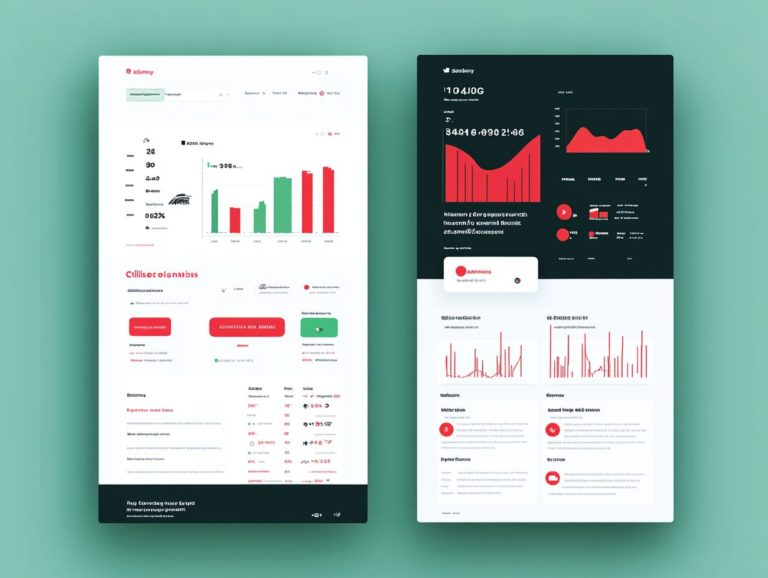5 Ways to Improve Your Website’s SEO
Let's Set Up Your Lead Generation Strategy
Fill out the form below, and our team will get in touch with you to create a tailored solution for your business.
In today s digital landscape, having a well-optimized website is essential for your success.
Search Engine Optimization (SEO) increases your site s visibility in online search results, drives organic traffic, and enhances your credibility.
This article explores five effective strategies that can elevate your website s SEO. From conducting thorough keyword research to building quality backlinks, each section provides practical insights and best practices.
Whether you re just starting out or refining your skills, these tips will guide you through the world of SEO and significantly improve your online presence.
Contents
- Key Takeaways:
- 1. Perform Keyword Research
- 2. Optimize Your Website’s Content
- 3. Utilize On-Page SEO Techniques
- Let's Set Up Your Lead Generation Strategy
- 4. Build Quality Backlinks
- 5. Regularly Monitor and Adjust Your SEO Strategy
- What Is SEO and Why Is It Important for Websites?
- Let's Set Up Your Lead Generation Strategy
- Let's Set Up Your Lead Generation Strategy
- Let's Set Up Your Lead Generation Strategy
- What Are the Future Trends in SEO?
- Frequently Asked Questions
- What are the top 5 ways to improve my website’s SEO?
- How can I ensure my website is using the right keywords for SEO?
- What should I include in my website’s meta tags for optimal SEO?
- Why is it important to regularly publish new content on my website for SEO?
- How do backlinks impact my website’s SEO?
- What are some social media platforms I can use to boost my website’s search engine optimization?
- Frequently Asked Questions
Key Takeaways:

- Performing keyword research is crucial as it helps you understand what your target audience is searching for and aligns your content with their queries.
- Optimizing your website’s content with relevant keywords and high-quality information can greatly improve your search engine rankings and attract more organic traffic.
- Utilizing on-page SEO techniques such as information about your content that helps search engines understand it better, internal linking, and image descriptions can enhance your website’s visibility and overall performance.
1. Perform Keyword Research
Conducting keyword research is a vital step in your search engine optimization (SEO) journey. It helps you uncover relevant search queries that can significantly boost your website s visibility and organic rankings on platforms like Google, Bing, and Yahoo.
Using tools such as Google Keyword Planner and Moz can provide invaluable insights into potential target keywords by analyzing search volume, competition, and trends. Understanding what users are looking for when they search online is equally important; it ensures that the keywords you choose resonate with their needs, whether they seek information, navigation, or making a purchase.
To integrate these keywords into your content strategy, follow these best practices:
- Integrate keywords naturally within your headings, subheadings, and body text.
- Optimize your meta descriptions and image alt tags.
This thoughtful integration not only boosts your SEO performance but also enhances user engagement by delivering valuable and relevant content.
2. Optimize Your Website’s Content
To elevate your SEO and enhance user experience, optimizing your website’s content is key. Ensure that it is authoritative, fresh, and aligned with user intent this combination ultimately contributes to improved Google rankings.
Regularly updating your content attracts repeat visitors and signals to search engines that your site is active and relevant. Including high-quality visuals can capture your audience’s attention and improve comprehension.
Understanding what your audience really wants is key to winning them over! A user-friendly layout enhances the overall experience and reduces bounce rates. Effective interlinking between related articles helps with seamless navigation, keeping readers engaged and encouraging them to explore more of your site.
Start applying these strategies today and watch your online presence grow!
3. Utilize On-Page SEO Techniques
Utilizing on-page SEO techniques is crucial for boosting your website’s visibility in search engine results pages (SERPs). Make sure key elements like title metadata, description metadata, and keyword metadata are expertly optimized to stand out in search results!
Don t overlook the importance of alt tags for images. They play a vital role in conveying the content of visual elements to search engines, aiding in proper image indexing, and enhancing accessibility for users with disabilities.
Let's Set Up Your Lead Generation Strategy
Fill out the form below, and our team will get in touch with you to create a tailored solution for your business.
Implementing schema markup, a way to help search engines understand your content better, offers another layer of sophistication. This could get you rich snippets that boost visibility in the SERPs, significantly improving your click-through rates.
Crafting compelling meta descriptions not only summarizes your web page but also serves as a persuasive element that entices users to click and dive deeper into your content.
When combined, these on-page techniques create a powerful synergy that dramatically enhances user engagement and elevates your website’s overall search performance.
4. Build Quality Backlinks
Building quality backlinks is a key part of effective SEO, as it boosts your site’s authority and enhances its visibility in search engines. Developing a link-worthy site through strategic content partnerships is essential.
You can employ various link-building strategies, such as guest blogging and outreach. Guest blogging allows you to share your perspective on reputable platforms, creating valuable opportunities for backlinks. Meanwhile, effective outreach efforts aimed at influential bloggers and website owners can lead to fruitful collaborations.
Utilizing Google Search Console is crucial for monitoring your backlink health; it helps you identify toxic links and maintain high quality.
Focus on quality over quantity; just a few authoritative backlinks can significantly elevate your search rankings, while a multitude of low-quality links could tarnish your site’s credibility.
5. Regularly Monitor and Adjust Your SEO Strategy

Actively monitor and adjust your SEO strategy now to stay ahead of the competition! This is essential for maintaining and enhancing your website’s performance in SERPs. By ensuring that site audits, content updates, and data from Google Ads inform your approach, you can maximize site traffic effectively.
Comprehensive site audits help you identify critical areas needing improvement, whether it s slow loading times or broken links that compromise user experience. Analytics play a pivotal role in this process, providing valuable insights into visitor behavior and engagement.
Utilizing tracking tools like Google Analytics or SEMrush enables you to perform a deeper analysis of your site s performance, revealing trends and opportunities for optimization. Timely content updates not only boost relevance but also signal to search engines that your site is active, enhancing search rankings and visibility.
This multi-faceted approach ensures sustained growth, maintaining a competitive edge in the digital landscape, especially in your content marketing efforts.
What Is SEO and Why Is It Important for Websites?
SEO, or search engine optimization, is your key to enhancing a website’s visibility in online search results an essential step for improving your online presence and attracting organic traffic, especially on major search engines like Google.
This strategic approach is fundamental in digital marketing, ensuring that your website climbs the rankings and resonates deeply with your target audience. A well-optimized site does more than just attract visitors; it significantly boosts user engagement through relevant content and a seamless browsing experience.
Over time, effective SEO transforms your brand s digital footprint, paving the way for long-term growth and sustainability in a highly competitive landscape. In today s bustling online marketplace, mastering SEO techniques could be the differentiator that propels your website to success.
Let's Set Up Your Lead Generation Strategy
Fill out the form below, and our team will get in touch with you to create a tailored solution for your business.
How Do Search Engines Rank Websites?
Search engines like Google rank websites using intricate algorithms that assess various factors, including content quality, user experience, and site traffic, to determine their relevance and authority in response to search queries.
Beyond these foundational aspects, technical SEO is crucial. It refers to the behind-the-scenes work that helps your website be noticed by search engines. This includes elements like site speed, mobile-friendliness, and secure connections, all of which work together to create a seamless browsing experience.
User engagement metrics such as click-through rates, bounce rates, and the time spent on a page offer valuable insights into how well your website meets users needs.
By understanding these key factors, you can make informed adjustments to optimize your visibility in search results. This strategy not only attracts more organic traffic but also enhances user satisfaction, setting your website up for success!
What Are the Key Factors in SEO?
The key factors in SEO involve a mix of important elements, including technical SEO, content quality, backlinks, and user experience all of which harmoniously elevate a website’s search engine performance.
Understanding each of these components is essential for anyone aiming to enhance their online visibility. Technical SEO lays the groundwork, ensuring your site is crawlable and free of errors, while high-quality content captivates users and keeps them engaged.
Backlinks serve as endorsements, signaling to search engines that your site is a credible source. User experience has a direct impact on how visitors interact with your website, influencing bounce rates and conversion metrics.
To optimize these factors, conducting regular site audits is crucial. Stay informed about algorithm updates and leverage tools like analytics and Google Search Console to monitor your progress and pinpoint areas for enhancement.
How Can Keyword Research Improve Your SEO?
Keyword research is essential for elevating your SEO game and search engine optimization. It helps you identify target keywords and keyword phrases that resonate with user search intent, guiding you toward effective content creation and optimization strategies.
Start by gaining a deep understanding of user intent and your audience’s needs and preferences. This insight allows you to pinpoint the terms and phrases that potential customers are actively searching for.
By utilizing a variety of tools like Google Keyword Planner, SEMrush, and Ahrefs you can uncover valuable insights into search volume, competition, and related queries.
Analyzing these metrics gives you the power to prioritize keywords that promise high traffic potential and fit seamlessly into your content. When you integrate these keywords into your website copy, meta descriptions, and headings, you significantly enhance your site’s visibility and relevance.
This strategic approach drives more organic traffic and boosts user engagement, making your online presence all the more compelling!
What Are the Best Practices for On-Page SEO?

The best practices for on-page SEO revolve around optimizing title data and description data while enhancing user experience with effective linking to other pages on your site and other sites and a well-structured content layout and user-friendly design.
Let's Set Up Your Lead Generation Strategy
Fill out the form below, and our team will get in touch with you to create a tailored solution for your business.
Focusing on headers elevates readability and aids search engines in comprehending the content hierarchy more effectively. It s vital to employ descriptive, keyword-rich alt tags for images, as these can significantly boost visibility and accessibility images can be a powerful traffic driver when tagged correctly.
In today s digital landscape, ensuring that your site is mobile-responsive is paramount, allowing users to navigate seamlessly, regardless of the device they re using. Regularly conducting audits will help you pinpoint areas for optimization.
Utilize tools like Google’s Mobile-Friendly Test and maintain a vigilant eye on analytics to assess which strategies are delivering the best results.
Start optimizing your website today for better visibility!
How Can Building Backlinks Help with SEO?
Want to boost your website’s visibility? Building backlinks is key! Backlinks are crucial for your SEO strategy because they enhance your website’s authority and credibility factors that search engines like Google consider when determining your rankings for relevant keywords. These links act as endorsements, signaling to search engines that your content is both valuable and trustworthy.
To achieve effective link building, consider a variety of strategies:
- Create high-quality, informative content that naturally attracts links.
- Engage in content partnerships with other reputable sites to expand your reach.
- Collaborate with influencers or niche bloggers, as their established audiences often trust the content they share.
- Utilize guest blogging opportunities to generate valuable backlinks while enhancing your online presence.
By implementing these techniques, you can elevate your website’s standing in the vast digital landscape.
What Tools Can Help with Monitoring and Adjusting SEO?
A range of SEO tools, including Google Search Console and various analytics platforms, is available to monitor and fine-tune your SEO strategy based on performance measures and site audits. These tools are invaluable because they pinpoint areas that need improvement and give you the power to make data-driven decisions.
For example, keyword tracking features illuminate which terms are bringing in traffic, while site audit tools reveal technical issues that could be holding back your search rankings. Platforms like SEMrush and Ahrefs offer competitive analysis, providing a clear understanding of your position relative to industry rivals.
With insights gathered from these platforms, you can refine your content strategies, enhance user experience, and adapt to ever-evolving algorithms, ultimately driving better results over time.
What Are Some Common Mistakes to Avoid in SEO?
Avoiding common SEO mistakes is essential for preserving your website’s credibility. Oversights such as keyword stuffing, neglecting user experience, and allowing broken links can diminish your site’s visibility on search engines.
One frequent misstep is keyword stuffing, where excessive use of targeted terms leads to penalties, making your content feel forced. Slow loading times can create a poor user experience, driving visitors away.
To steer clear of these pitfalls, focus on creating high-quality, relevant content, optimizing your page speed, and regularly checking for broken links. This diligence ensures a smooth browsing experience for your users.
How Can a Business Measure the Success of Their SEO Efforts?
To measure your SEO success, focus on key metrics like site traffic and conversion rates. This allows you to effectively gauge your performance and return on investment.
Utilizing tools such as Google Analytics becomes critical, offering deep insights into user behavior. By tracking metrics like organic search traffic, bounce rates, and average session duration, you can uncover trends and pinpoint areas that need improvement.
Let's Set Up Your Lead Generation Strategy
Fill out the form below, and our team will get in touch with you to create a tailored solution for your business.
Setting up these metrics typically involves creating goals and configuring filters within Google Analytics. Interpreting these figures requires a clear understanding of SEO; for example, a high bounce rate might signal irrelevant content, prompting you to make essential changes to enhance the user experience.
What Are the Future Trends in SEO?

The future trends in SEO are significantly influenced by advancements in search engine algorithms, enhancements in user experience, and the growing importance of voice search, digital marketing, and AI-driven technology.
As you navigate these shifts, it’s crucial to recognize how user behavior is evolving. More people are turning to natural language queries and mobile searches. This transformation calls for a fresh approach to your content strategies, spotlighting conversational keywords and local optimization.
AI tools are not just altering search patterns; they are also enabling hyper-personalized marketing efforts. To stay ahead in this ever-changing landscape, understanding these emerging trends is essential. This ensures your digital strategies resonate with increasingly sophisticated consumers.
Frequently Asked Questions
What are the top 5 ways to improve my website’s SEO?
- Use relevant keywords: Research and incorporate keywords related to your business into your website content.
- Optimize meta tags: Ensure your title tags and meta descriptions are keyword-optimized and accurately describe your content.
- Create quality content: Regularly publish engaging, high-quality content with relevant keywords to attract and retain visitors.
- Build backlinks: Obtain links from reputable websites to enhance your site’s credibility and visibility.
- Utilize social media: Share your website content on social media platforms to increase visibility and drive traffic.
How can I ensure my website is using the right keywords for SEO?
Conduct thorough keyword research to identify the most relevant and frequently searched terms in your industry. Use tools like Google Keyword Planner or SEMrush to find potential keywords and their search volumes. Consider your target audience’s language when choosing your keywords.
Your meta tags should accurately describe each page’s content and include relevant keywords. The title tag should be concise, featuring your business name and primary keyword. The meta description should summarize the page while enticing readers to click through to your site.
Why is it important to regularly publish new content on my website for SEO?
Search engines like Google love fresh content! By consistently updating your website, you signal to search engines that your site is active and relevant, which can improve your ranking in search results. Regular updates also give visitors a reason to return, increasing conversion chances.
How do backlinks impact my website’s SEO?
Backlinks, or inbound links, are links from other websites directing users to your site. Search engines view backlinks as votes of confidence in your content’s authority and credibility. The more high-quality backlinks your site has, the higher it can rank in search results. Focus on acquiring links from reputable sources relevant to your content.
Platforms like Facebook, Twitter, Instagram, and LinkedIn can drive traffic to your website and improve your SEO. By sharing links to your content, you increase visibility and reach a broader audience. Strong social media profiles often rank high in search results, enhancing your overall search engine visibility.






